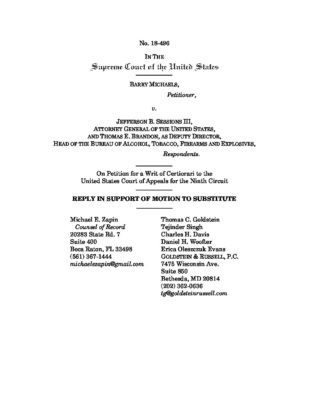One case I’ve been following with great interest is (well, was) Michaels v. Sessions in which by a strange turn of events the Supreme Court is being asked to decide whether
Matthew G. Whitaker is or is not the Attorney General.
The underlying matter isn’t in my wheelhouse, having to do with the constitutionality of a federal ban on possession of firearms by convicted felons. Michaels lost in the court of appeals, and duly asked the Supreme Court to hear his appeal via a petition for writ of certiori. While that was pending, Trump forced out Sessions; whether Sessions legally resigned or was fired is actually a not-irrelevant issue. Trump then tapped Whitaker to take over the job of Attorney General, purporting to exercise power delegated under the Vacancies Act.
The Vacancies act is a mire of constitutional and structural issues, but suffice it for now to say that it does give the President vast authority to fill vacancies with a wide variety of government employees, but it also contains exceptions, one of which very arguably applies to the Attorney General’s office becuase there is a specific statute that provides for succession in the AG’s office. Under that statute Rod Rothstein, the #2 in the department, would automatically becoming the Acting Attorney General until a successor was properly nominated and confirmed (or, I presume, given an interim appointment–an option that the Senate has quietly foreclosed by having pro-forma sessions every few days during the recess thus preventing the Constitutional trigger that permits interim appointments).
When a person sues the United States about a regulation, it is common to caption (that’s lawyer for “title”) the case with the name of the movant and the government official who heads the agency. When there is turnover at the head of an agency, as there often is, it is usually routine for the name of the case to change too — on request of a party, the court just amends the caption of the case.
That is what happened with the petition for certioria — until Michaels’s lawyers objected. Earlier this month they filed a “Motion to Substitute” in the Supreme Court in which they asked the Court to rule that the case should be captioned “Michaels v. Rothstein” rather than “Michaels v. Whittaker” as Rothstein, not Whittaker, was in fact the Acting Attorney General. Needless to say, the government objected. Michael’s lawyers replied with one of the most muscular briefs I’ve ever read. If you are a lawyer or law student, this is a must-read.

The Supreme Court has not yet ruled, and it could do so without a hearing if it chose to do so.




